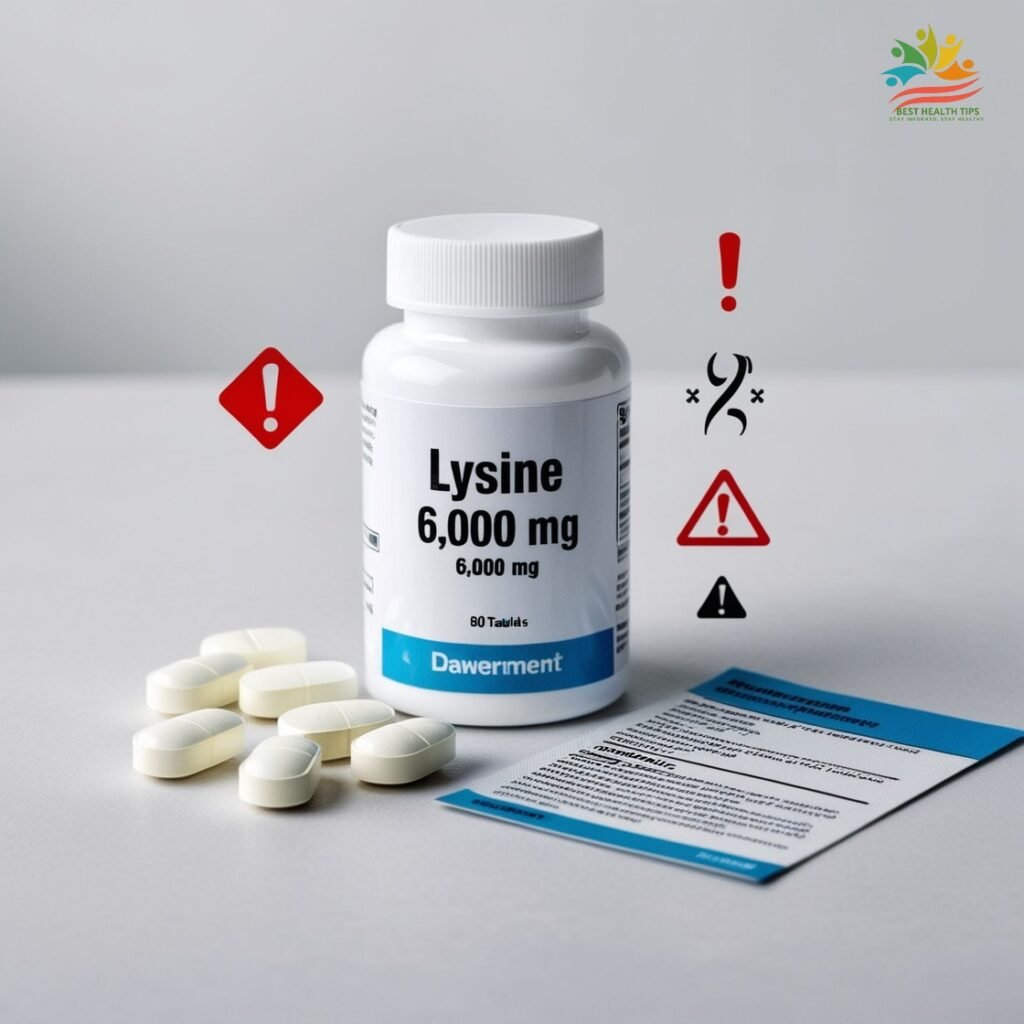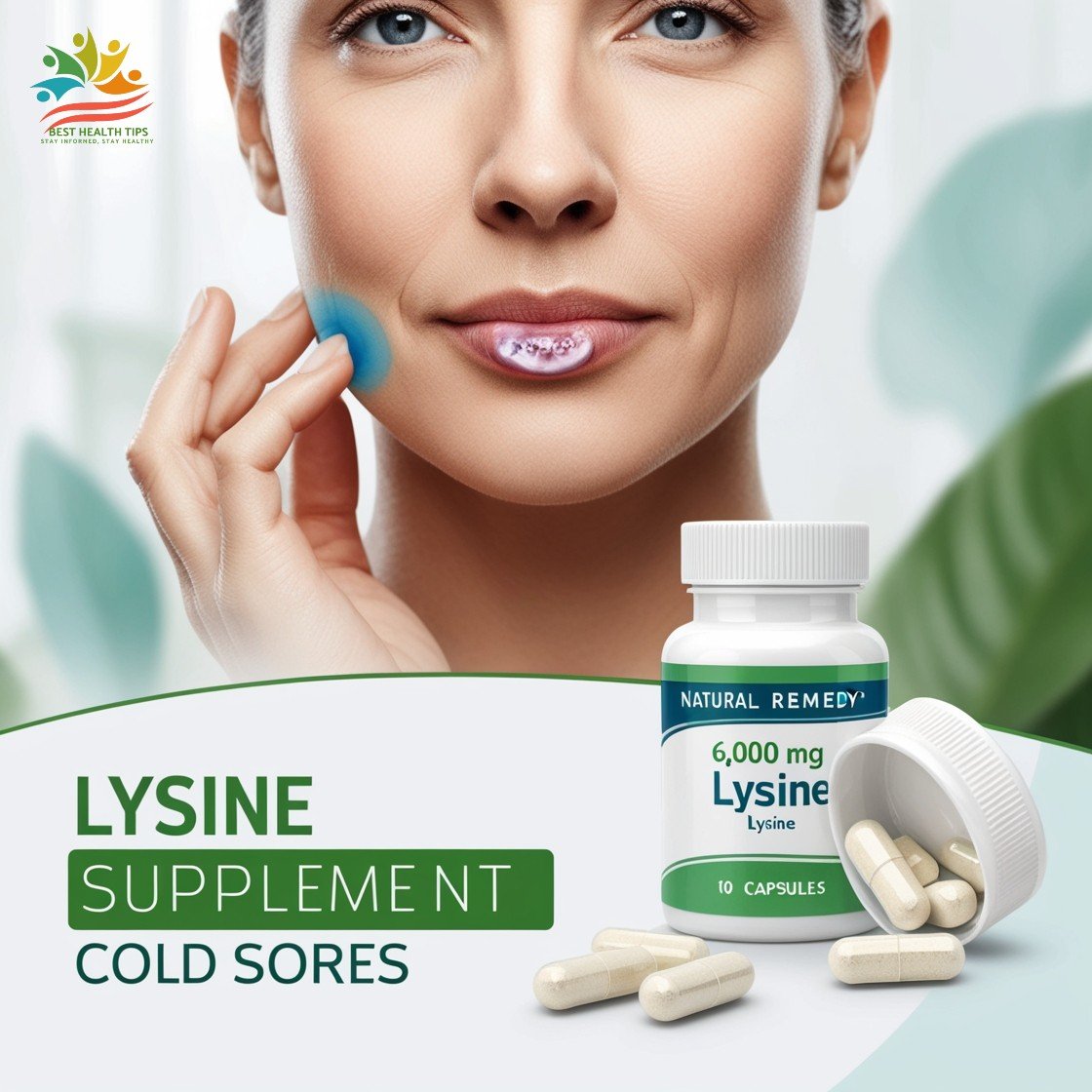Introduction
Cold sores are a common painful viral conditions, usually causing subjective complaints that interfere with daily life and socialization. The herpes simplex virus (HSV-1) causes it and can cause periodic recurrences, often due to various triggers such as stress, illness, or sun exposure. As if the drugs for a cold sore are not the best remedy, most readers resort to other drugs over and above it, some of which are lysine. This review of its use at dosages ranging from up to 6,000 mg of Lysine for the cold sores outbreak evaluates its likely efficacy, adverse effects, as well as proper usage.
What is Lysine?
Lysine is a basic amino acid that our body cannot produce and must consume through food or supplements, and it plays a key role in the synthesis of proteins, enzymes, and hormones, as well as for immune function. It’s also been used for years to help manage cold sore outbreaks because it has an antiviral effect; it inhibits the replication of HSV-1.
How Lysine Can Help with Cold Sores?
Scientists have shown that lysine could lower the frequency, severity, and healing time of cold sore attacks. It is believed to act in several mechanisms:
1. Inhibition of Arginine Absorption
- Lysine can inhibit the activity of HSV-1 through the inhibition of another amino acid required for the virus’s replication. Arginine is necessary for the replication of HSV-1; hence, the increase in lysine will limit the arginine levels, slowing or inhibiting the viral replication.
2. Enhancement of Immunity
- Lysine can enhance the immunity in the body, helping the body fight off any stimuli that might trigger the replication of HSV-1 virus.
3. Direct Activity Against HSV-1
- There are a few studies showing direct activity of lysine against the virus itself, although how it acts is not fully known.
Why 6,000 mg of Lysine?
Most of the lysine supplements have dosages ranging from 500 mg to 1,000 mg per capsule or tablet. A normal preventive dose is said to fall between 1,000 and 3,000 mg per day. Some people may prefer using a higher dosage, say 6,000 mg, especially when they are in the initial stages of a cold sore outbreak or during periods that they tend to be exposed to possible triggers.
- Emergency dosing for full-blown active outbreak. Sometimes people are advised to take even higher doses, up to 6,000 mg a day, when they can feel the paresthesia or burning, a sign that the outbreak is on its way. This potentially allows inhibition of replication quicker than otherwise, therefore decreases both size and length of outbreak.
- Some patients – particularly those who get a recurrence several times in the last week or several attacks occur during a certain time-period, might prefer an effective dose. Especially such type of patient includes immune-compromised patient or persons who have an exceptionally severe level of psychological stress may be treated very well and successfully by it.
- Greater Substantial Suppressive Impact: Perhaps patients experiencing a smaller amount of dosing may have an effect, especially when they impair a person’s quality of life by their intensity and prevalence.
Scientific Study Conclusion: Lysine on Cold Sores

Evidence from studies with the help of lysine as regards to the therapy on the cold sores came varied, but in potentialities. The succeeding research indicated that it prevented reappearances and prolonged durations.
1. Clinical trials and studies
Some clinical trials report daily lysine supplementation reduces the recurrence and healing time of outbreaks; one study in *Dermatologica* established that daily intake of up to 3,000 mg of lysine supplementation reduced the rate of oral herpes recurrence.
2. Self-reported benefits
Most people who take lysine report anecdotal evidence that it does reduce the severity of their cold sore symptoms and can cut down on the frequency of outbreaks. Some patients reported that taking 6,000 mg was significantly effective during an acute attack.
3. Preventive effect
There is also some evidence that lysine is effective for prevention even at lower doses, though some people with chronic problems might require 6,000 mg to make a difference.
Safety and Possible Side Effects of High-Dose Lysine (6,000 mg)
Lysine is safe; however, 6,000 mg a day is much higher than most recommended dosages, so here are possible risks and side effects:
1. Digestive Disturbances
High levels of lysine can cause gastrointestinal disturbance; diarrhea, stomach cramp, and nausea have all been reported. Doses of high magnitude could be split over more frequent doses throughout the day if that is being considered.
2. Function of Kidneys
This can change the rate of absorption of calcium, which may cause some issues when taken in very high doses over a long period, especially for those with kidney disorders. If one has kidney disease, first consult a doctor before taking high dose lysine intakes.
3. Reactions with Drugs
Lysine may interact with calcium supplements and antibiotics. If you are on other supplements or drugs, please consult your health professional and get to know whether high-dose lysine will interact adversely.
4. Hypercalcemia Risk
High doses of lysine could contribute to increased absorption of calcium, which leads to hypercalcemia-a seriously dangerous condition if not monitored.

Dosing Directions: How to Take 6,000 mg of Lysine for Cold Sores?
Use the 6,000 mg Lysine for Treating Cold Sores Once in a dosed manner.
1. Dosing
If you expect an outbreak at the early stage of symptoms, aim at administering 1,000 to 2,000 mg every few hours as a way of reaching up to 6,000 mg. Administer a single dose of 6,000 mg to lessen gastric upset.
2. Tidal dosing
This refers to divided dose; three to six smaller divided doses with optimal absorption, as well as the adverse effects of the drug are usually minimized. For example, the dose can be divided such that 1,000 mg is given every three to four hours.
3. Short term
6,000 mg needs to be used exclusively during the initial outbreak stages. If this dose proves effective, discuss with your healthcare professional how it should be used safely long term.
4. Food
Lysine is relatively safe whether taken with food or without food. When Lysine is causing nausea, you should take it with food or a snack.
Other ways of applying lysine for proper cold sore management:
1. Arginine-Containing Food Products
Avoid intake of arginine-containing food products. Some of the food products high in arginine include nuts, chocolate, and whole grains. These can retard lysine’s activity toward herpes sores. Use lesser amounts of such foods while undergoing an attack.
2. Vitamin C and zinc
These can help and amplify the immunity process of the body and further activate the action of lysine. To date, researchers have proven that zinc inhibits the pathogenic agent HSV-1.
3. Stress Management
Since stress is one trigger factor for the outbreak of cold sores, improving the frequency of occurrence in combination with lysine, mindfulness meditation, exercise, and sufficient sleep helps.
4. Lysine Creams
Apart from oral supplements, you can apply lysine cream directly to the affected area on the skin for relief.
Conclusion: Is 6,000 mg of Lysine Suitable for You?
While some people may find supplementation at 6000 mg of lysine to be an effective strategy for recurrent or major recurrences of cold sores, caution is necessary. A vast majority of anecdotal evidence exists about high-dose use of lysine, with little, if any, clinical support; healthcare providers should discuss the use of this approach, especially in the presence of other health problems.
In practice, for most persons, standard doses between 1,000 and 3,000 mg frequently are enough to effectively cope with cold sores if you haven’t found the relief at lower doses of this supplement, then gradually increasing under careful monitoring also is worth considering. Also, Balancing potential benefits against risks and understanding what your body needs with all supplements will help you find the best and safest approaches for managing a cold sore.
Read more about cure and treatment and other categories at besthealthtipss.


